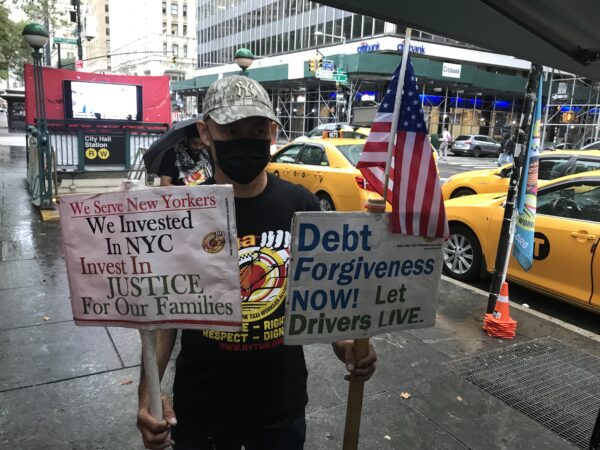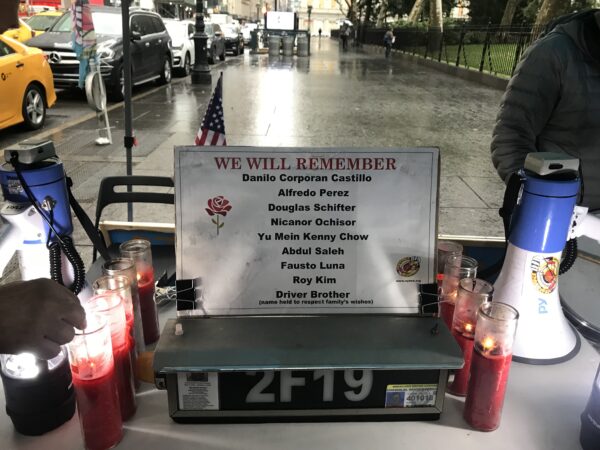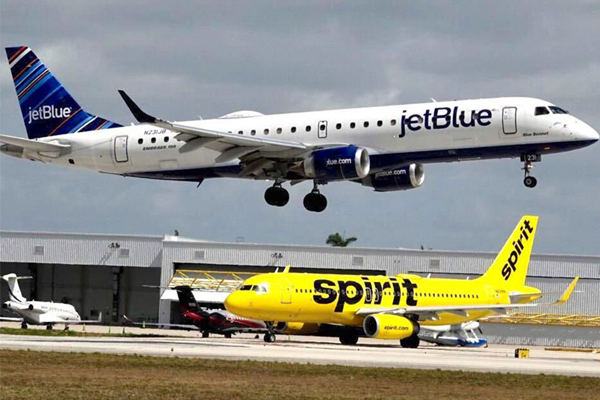
NEW YORK, N.Y.—State Senator Jessica Ramos and City Councilmember Ydanis Rodriguez are backing the New York Taxi Workers Alliance’s debt-relief plan, saying it will help drivers more and be more fiscally sound than the city’s proposal.
“They should add more millions of dollars. What we have seen right now is not enough,” Rodriguez (D-Manhattan), chair of the Council’s Transportation Committee, told about 20 cabbies at their vigil on the sidewalk outside City Hall Sept. 28, next to parked yellow cabs with “Debt Forgiveness Now! Save Drivers’ Lives” signs taped to the windows.
The city Taxi and Limousine Commission’s plan would appropriate $65 million to give drivers overwhelmed with debt $20,000 for a down payment on the principal they owe, and another $9,000 to help with the first year’s monthly payments.
The TLC estimates that owner-drivers owe an average of $550,000, largely incurred buying medallions between 2002 and 2014, when their value inflated from $200,000 to more than $1 million. That debt is now far more than the medallions are worth, as their value collapsed when Uber and Lyft devastated drivers’ income, and the COVID-19 pandemic decimated what was left.
Marblegate, the Connecticut investment firm that bought up the right to collect more than 3,000 drivers’ loans at a substantial discount, has offered to reduce those debts to $275,000, with a $1,600 monthly payment.
NYTWA’s plan would have the city guarantee the loans, paying off the full balance if drivers default. In return for those guarantees, the lenders would reduce loan balances to $145,000, with monthly payments set at $800.
That guarantee, NYTWA executive director Bhairavi Desai told the vigil, will give the city enough leverage to get the lenders to reduce debts, and would also protect drivers from having their homes or cabs seized.
“Our proposal is far more sound,” Desai told LaborPress after the rally. “What we care about is the new principal and the new monthly payments.”
Reducing a $550,000 debt by $200,000 or so wouldn’t make much difference to drivers’ ability to pay it off or make a living, she says. Owner-drivers testifying at the TLC’s Sept. 27 hearing said that at the $2,000 a month proposed by the commission in exchange for a 40% reduction in debt, or the $1,600 offered by Marblegate, older drivers could work 60 hours a week for the rest of their lives and still not pay it off.
Ramos (D-Queens), chair of the Senate Labor Committee, told a TLC hearing Sept. 27 that the inflation of medallion prices was a “speculative loan bubble created by the city of New York” and that “predatory financial institutions” had taken advantage of immigrant drivers.

“The plan put forward by the TLC does not go nearly far enough to relieve the burden experienced by drivers,” a spokesperson for Ramos told LaborPress. “While it’s commendable that they provided $65 million towards debt relief, the way the money is being leveraged to restructure drivers’ debt serves the banks, not the drivers.”
The NYTWA plan, she added, “is fiscally sound because drivers would be less likely to default. In the estimated models we’ve inspected, that assume the highest default rates seen at the height of yellow-cab taxi defaults, the program would cost $93 million over 30 years.”
In February, Ramos and Sen. Brad Hoylman (D-Manhattan) introduced a bill, the New York State Taxi Medallion Debt Relief Act, that would have the state Urban Development Corporation give lenders a $125,000 guarantee on their loans if they reduced the balances to $125,000, to be paid over 20 years at 4% interest. The bill, S.4393, was referred to committee and has not yet received a hearing.
“This is the city’s responsibility, but we are prepared to make a huge push to implement S.4393, which carries the NYTWA’s plan on the state level,” the spokesperson said.
TLC chair Aloysee Heredia Jarmoszuk said at the Sept. 27 hearing that the $65 million was all the funds that were available, and the city can’t use federal pandemic aid directly to help drivers.
NYTWA disagrees. Congress gave the city $6 billion in aid, and it has a $2 billion budget surplus. “It’s one of the few moments in history where the city cannot claim it doesn’t have the money,” Desai says.
“[Senator Charles Schumer] specifically noted his support for this relief when he delivered the $6 billion COVID aid that has given the city a meaningful surplus,” Ramos’s spokesperson said. “This is what federal stimulus is for.”
The mayor’s press office did not respond to questions from LaborPress.



